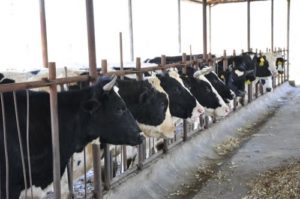
In response to outcry from farmers and other advocates, U.S. Senators Mike Rounds and John Thune introduced a bill that would change the USDA’s policy regarding. The use of “Product of the USA” labeling on meats sold to consumers.
In an op-ed published in the Argus Leader, Thune explained that the bill would specifically make the Food Safety and Inspection Service’s beef labeling requirements more transparent by preventing processed meat products sold in the U.S. that contain foreign-sourced beef from using the label. Processing typically involves cutting up unprocessed meats into smaller pieces and repackaging them, according to Bloomberg.
“Current federal regulations include a loophole that allows beef from livestock born. Raised and slaughtered in foreign countries to be labeled ‘Product of the U.S.A.’ as long as the beef. Undergoes additional processing at a plant in the U.S. This is wrong,” Thune argued in the op-ed.
Loophole Created by 2015 COOL Repeal
According to a 2017 Stone Barns Center report, imported grass-fed beef products accounted. For between 75% and 80% of overall beef sales at the time following the December 2015 repeal of the Country of Origin Labeling requirement. The federal repeal of COOL allowed for the current loophole, which Stone Barns argued benefits international meat packing companies including JBS and Cargill. In 2018, the National Farmers Union called for the loophole to be closed because it had put U.S. ranchers. And farmers and their families at a disadvantage due to the fact that imported products can be sold at relatively lower prices.
“Today, four companies, Cargill, Tyson, JBS and National Beef, control over 80 percent of the beef market. All four of these multinational corporations depend on imported meat and meat products,” NFU President Roger Johnson said at the time.
Before the repeal, however, the World Trade Organization. Had rule in favor of meat producers in Mexico. And Canada and the “U.S beef industry” in an ongoing dispute in which. They argued that COOL gave domestic producers a market advantage, according to Food Safety News.
Industry Response to Demand for U.S. Products
At least one major U.S. meat processing company has respond. To recent consumer demand for products. That are not import and chosen to “eat” the relatively higher cost of raising livestock domestically. According to Bloomberg. In May 2019, Perdue Farms began the process of acquiring Panorama Meats. The largest domestic certified-organic and grass-fed beef producer. Which raises livestock on one million acres of grasslands in western American states.
Keep up with all the latest label-related news and developments. In the beef industry by following Argon’s U.S. website or Canadian page.
 Visit our US Store
Visit our US Store Visit our Canadian Store
Visit our Canadian Store US Customers
US Customers
 US Customers
US Customers Follow us on facebook
Follow us on facebook Follow us on twitter
Follow us on twitter Follow us on linkedin
Follow us on linkedin Follow us on youtube
Follow us on youtube Follow us on google+
Follow us on google+ Pinterest
Pinterest
Leave a Reply